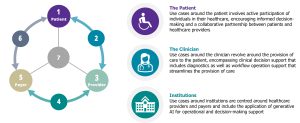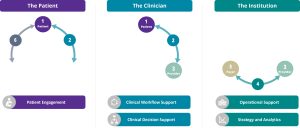
Written by

Cranfield, UK, 30th April 2024 – This series of Insights focuses on the applications of generative AI solutions. This is a precursor to a more in-depth analysis of Signify Research’s Generative AI Market Intelligence Service.
In my first Insight, we defined what generative AI (gen AI) is and discussed the gen AI value chain and how the ecosystem is centred around big tech. To recap, gen AI is an AI built on a foundation model trained on a large corpus of unlabelled data. In contrast, traditional machine learning algorithms use labelled data and are trained to perform a specific task.
Figure 1: Generative AI Value Chain

As you may remember from the first Insight, the care network concept was introduced with three stakeholders: the patient, provider and payer. The interconnection between them serves as the application areas for gen AI, summarised in the diagram below.
Figure 2: The Care Network

From the care network, we can identify three end-user groups with similar use cases. These end users are patients, clinicians, and institutions.
The use case clusters around these end-user groups are presented in the graphic below.
Figure 3: End User Groups and Use Case Clusters

Following on from the two previous Insights that looked into the Patient and the Clinician view and related gen AI applications, this insight will look at the possible applications from the Institution’s perspective and conclude the series of Insights on gen AI in healthcare. The following Insight will look at the applications in the pharma and life sciences sector.
Setting the Scene
The payer and provider end users have been clustered under the single Institution end user, with two distinct use case cluster groups: Operational Support and Strategy and Analytics, as shown in the diagram below. Payer and Provider have been coupled together as although they are distinct from one another, their use cases in healthcare are broadly similar. For example, similar use of gen AI can be done from the aggregation of the population perspective where the provider will be interested in developing applications for Population Health Management (PHM) to improve patient outcomes; the payer can use a similar set of tools and applications to reduce the underlying costs as well as from the Operational Support perspective where both organisations will face the same potential synergies from incorporation of gen AI in marketing, HR, admin etc.
Figure 4: The Institution Use Case Clusters

Operational Support
Beyond its traditional role covered in the previous Insights, gen AI is proving to be a valuable asset in enhancing operational support functions within healthcare organisations along several dimensions.
Marketing – Automated content creation tools powered by generative AI can assist healthcare organisations in producing engaging and informative content.
Human Resources – Generative AI algorithms can assist HR departments in identifying and recruiting top talent. By analysing resumes, assessing candidate suitability, and predicting future performance, these tools streamline the hiring process and contribute to building a skilled and diverse workforce.
Admin – Generative AI algorithms can help optimise appointment scheduling, ensuring efficient utilisation of resources. By considering factors such as patient preferences, staff availability, and facility capacity, AI-driven systems can reduce wait times and enhance the overall patient journey.
Supply Chain Management – Generative AI can assist healthcare organisations in optimising supply chain operations. Generative algorithms can predict demand by analysing historical usage patterns, preventing stockouts or overstock situations. This ensures a smooth flow of medical supplies, reduces waste, and ultimately contributes to cost savings. In addition, through machine learning capabilities, generative AI predicts optimal ordering quantities and schedules.
Predictive Maintenance – Generative AI can facilitate predictive maintenance for medical equipment by analysing data on equipment performance and usage patterns. This proactive approach minimises downtime, reduces the risk of equipment failures, and extends the lifespan of critical medical machinery. Beyond medical equipment, generative AI also monitors the infrastructure of healthcare facilities. By analysing data related to energy consumption, building maintenance, and environmental factors, organisations can optimise operations, reduce costs, and ensure a safe and comfortable environment for patients and staff.
Data Security & Compliance & Fraud Detection – Generative AI employs advanced analytics to detect patterns indicative of fraudulent activities. By continuously monitoring data patterns, AI algorithms can detect and prevent fraudulent activities, ensuring the security and privacy of patient information. Furthermore, AI-powered tools assist healthcare organisations in maintaining compliance with regulatory standards. From data storage to patient confidentiality, generative AI contributes to ensuring that healthcare operations align with industry regulations.
Legal Compliance – Generative AI can streamline legal and compliance processes by automating documentation and ensuring adherence to regulations. By analysing legal documents and compliance standards, AI-driven tools can identify potential risks, errors, or areas of improvement, enabling healthcare organisations to maintain a robust legal and regulatory framework.
RCM – Generative AI can accelerate the claims review process by automating the analysis of medical codes, documentation, and eligibility criteria. This reduces the likelihood of errors, enhances accuracy in claims submissions, and ensures timely reimbursement for healthcare providers. Generative AI can analyse complex payer contracts, extracting key terms and conditions to ensure compliance and accurate billing. This minimises contractual disputes and facilitates efficient negotiation processes between healthcare providers and payers.
Gen AI can predict the likelihood of claim acceptance or rejection based on historical data and conduct analyses of denied claims to identify root causes. This enables healthcare providers to proactively address potential issues, improve claim acceptance rates, and optimise the overall revenue cycle.
AI-powered tools can also streamline the appeals process by automating the generation of appeal letters and supporting documentation. This reduces the administrative burden on healthcare staff, expedites the appeals process, and increases the likelihood of successful appeals.
AI algorithms assess historical reimbursement data and market trends to assist healthcare providers in negotiating optimal reimbursement rates with payers. This ensures fair compensation for services rendered and supports financial sustainability for healthcare organisations.
For instance, R1 RCM developed AI models to help clinicians identify a patient’s insurance eligibility more efficiently. They also help health systems streamline writing an appeal for a complex clinical.
Content Generation – Generative AI models, particularly language models like GPT-3, can generate human-like text. This can be utilised to draft product manuals, providing clear and concise instructions on using and maintaining healthcare products. Furthermore, its conversational feature can provide users with an interactive format to offer help for their products instead of making users read a 1,000-page manual. The new format simplifies user understanding, boosts productivity, and promotes self-sufficiency. It addresses the challenge of underutilisation of advanced products faced by vendors and supports users without depending on specialised training.
Expediting Deployment – A significant application lies in expediting the deployment and training of IT solutions. Large health system contracts traditionally involve prolonged deployment timelines, often exceeding two years. Leveraging gen AI for automated training and system implementation has the potential to shorten these timelines. This acceleration would enable health IT vendors to scale more rapidly, addressing the demands of growing backlogs and facilitating quicker revenue recognition by considering Software-as-a-Service subscription models.
Customer Service – Large insurers like UnitedHealth Group and Elevance Health outlined their plans for AI to help improve customer service. Generative AI enables the creation of intelligent chatbots and virtual assistants that can engage in natural language conversations with customers. These bots can handle routine queries, provide information, and guide users through common tasks, freeing up human agents for more complex issues. Furthermore, gen AI can transcribe and analyse voice conversations, converting spoken words into text for further processing. This transcription allows for extracting valuable insights, sentiment analysis, and identifying trends to enhance overall service quality.
Strategy and Analytics
One of the key advantages of generative AI is its ability to make complex data analytics accessible to non-technical users. Through conversational prompts, healthcare professionals can interact with healthcare IT systems using natural language, bypassing the need for programming skills. This democratisation of data access and manipulation empowers decision-makers at various levels within the organisation, from clinicians to administrators.
Workforce Management – Gen AI can be integrated into a command centre where staff can coordinate and manage the response to emergencies, disasters, and other critical events. Gen AI can distil the data coming in and provide suggestions on how most efficiently to manage hospital utilisation.
PHM – Generative AI aids in analysing vast datasets to identify patterns and predict patient outcomes. By utilising machine learning algorithms, healthcare organisations can stratify patient populations based on risk factors, enabling targeted interventions and personalised care plans. This improves patient outcomes and optimises resource allocation within the healthcare system.
Healthcare providers can establish real-time monitoring systems for patients with chronic conditions through generative AI. By setting up automated alerts based on patient data, healthcare professionals can intervene promptly, preventing potential health crises and reducing hospital readmissions.
Notably, gen AI enables interactive conversations with datasets, eliminating the need for a specialised computer scientist. For instance, one can input complex queries like, “Retrieve all studies from female patients with breast cancer in the state of Tennessee, aged between 14 and 32,” streamlining population cohort selection without the necessity for intricate query formulations. One such vendor is Inference Analytics, an AI technology company that uses LLMs to improve healthcare by offering a platform to extract insights and knowledge from unstructured healthcare data.
VBC – Generative AI enhances the capability to predict clinical outcomes and assess the performance of healthcare interventions. By analysing historical data and clinical indicators, AI algorithms provide valuable insights into the effectiveness of treatments, supporting evidence-based decision-making in a value-based care model. Generative AI can play a crucial role in optimising costs and resource allocation within the context of value-based care. By analysing financial and operational data, AI-driven analytics enable healthcare organisations to identify inefficiencies, reduce unnecessary costs, and allocate resources strategically to enhance overall value in patient care.
Generative AI tools can transform complex data into intuitive visualisations. By visualising key performance indicators and trends, healthcare professionals can quickly grasp insights and make informed decisions without delving into intricate datasets.
Conclusion
In conclusion, the integration of gen AI across the healthcare landscape, spanning payer and provider domains, has showcased a potential paradigm shift in operational efficiency, strategic decision-making, and patient care. This article has underscored its versatility in transforming various facets of healthcare operations by clustering use cases and illustrating the diverse applications of gen AI. From operational support functions like marketing, human resources, and supply chain management to strategic analytics in PHM and VBC.
This Insight is an introduction to Signify Research’s Generative AI Market Intelligence Service, laying the groundwork for a comprehensive analysis. This service provides access to a robust product database beyond informative reports. This database facilitates a clear comparison of announced generative AI applications, offering a streamlined understanding of prominent use cases and competitive vendors. Tailored to empower decision-makers, this resource delivers valuable insights to guide strategic decision-making.
Related Research
Generative AI Market Intelligence Service 2024
This Market Intelligence Service delivers data, insights, and thorough analysis of the worldwide market potential for vendors leveraging Generative AI in healthtech. The Service encompasses Medical/Clinical IT, EMR & Digital Health, Pharma & Life Sciences, and Big Tech vendors, exploring their opportunities and strategies in the realm of generative AI.
About the Author
Vlad joined Signify Research in 2023 as Senior Market Analyst in the Digital Health team. He brings several years of experience in the consulting industry, having undertaken strategy, planning, and due diligence assignments for governments, operators, and service providers. Vlad holds an MSc degree with distinction in Business with Consulting from the University of Warwick.
About the AI in Healthcare Team
Signify Research’s AI in Healthcare team delivers in-depth market intelligence and insights across a breadth of healthcare technology sectors. Our areas of coverage include medical imaging analysis, clinical IT systems, pharmaceutical and life sciences applications, as well as electronic medical records and broader digital health solutions. Our reports provide a data-centric and global outlook of each market with granular country-level insights. Our research process blends primary data collected from in-depth interviews with healthcare professionals and technology vendors, to provide a balanced and objective view of the market.
About the Signify Research
Signify Research provides healthtech market intelligence powered by data that you can trust. We blend insights collected from in-depth interviews with technology vendors and healthcare professionals with sales data reported to us by leading vendors to provide a complete and balanced view of the market trends. Our coverage areas are Medical Imaging, Clinical Care, Digital Health, Diagnostic and Lifesciences and Healthcare IT.
Clients worldwide rely on direct access to our expert Analysts for their opinions on the latest market trends and developments. Our market analysis reports and subscriptions provide data-driven insights which business leaders use to guide strategic decisions. We also offer custom research services for clients who need information that can’t be obtained from our off-the-shelf research products or who require market intelligence tailored to their specific needs.
To Find out More:
E: enquiries@signifyresearch.net
T: +44 (0) 1234 986111
www.signifyresearch.net
